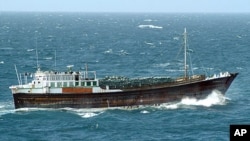India has banned mechanized sailing vessels, known as dhows, from sailing into some pirate-infested waters off the East African coast. The dhows appear to be involved in illicit trading out of a port controlled by a terrorist organization.
India's government is ordering small maritime traders not to sail south and west of Oman and the Maldives. The order by the Directorate General of Shipping in Mumbai was issued after seven India-flagged vessels, with 97 sailors on board, were reported missing and presumed hijacked by pirates off the Seychelles and the East African coast.
The vessels, all under 400 tons each, are based out of several ports in India's Gujarat State. Reports say the missing ships had been visiting the rebel-held port of Kismayo in Somalia.
India's Navy says it has repeatedly warned shipping authorities, with little effect, about the dangers of mechanized dhows venturing into the pirate-infested waters.
Navy spokesman Commander P.V.S. Satish tells VOA ship operators are reluctant to inform authorities their crews have been hijacked.
"I think it would probably be for fear of the fact that they would be prevented from going to these area and that would affect their livelihood. Sometimes it has happened in the past that we come to know much later that such an incident has actually happened," said Satish.
The dhows are part of a centuries-old tradition of Gujaratis trading between the African east coast and the Arabian Peninsula.
A Germany-based environmental group, Ecoterra, accuses the Indians of exporting charcoal and other contraband from the port to Dubai. It says the Indian fleet also may be involved in other criminal activity, such as human trafficking and delivering drugs and weapons.
Taking charcoal from Somalia to meet demand in the Gulf States is a lucrative, but illegal, trade blamed for deforestation in Somalia.
Africa researcher Roger Middleton, at the Chatham House research organization in London, tells VOA the India directive to ban its small merchant vessels from much of the Arabian Sea probably will have little effect in stemming the illicit Somali exports.
"Certainly if trade from India, or run by Indians, stops you would see no shortage of Somali businessmen and entrepreneurs who would probably be able to step into the gap. So I do not think Somalia is about to become cut off," he said.
Kismayo harbor is held by the anti-government al-Shabab, which is linked to al-Qaida and is designated a terrorist organization by the United States and United Kingdom.
Hijacked Indian Vessels Put Focus on Illicit Maritime Trade




